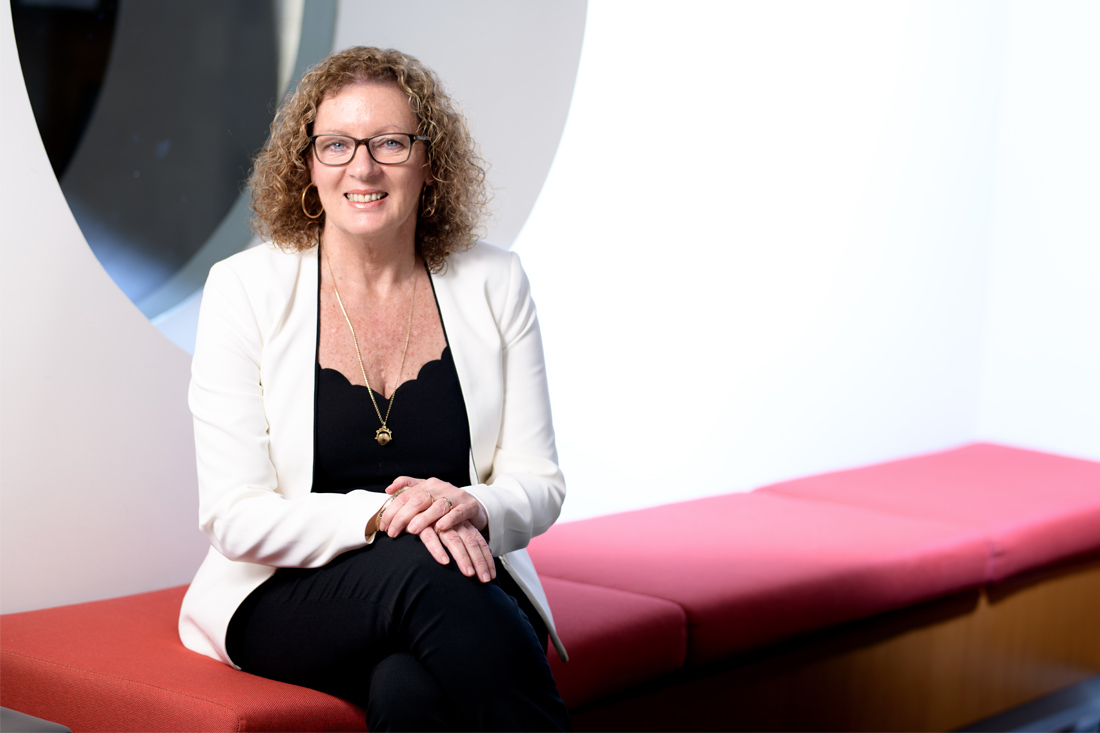Make positive change
'We're talking about our most vulnerable kids when we're talking about complex trauma and when we can see schools and teachers as having this power where we can intervene and we can help - not only do we help them access learning, but for their entire life, we can really make a positive impact on where they end up in the future.'
Real expert
I came to QUT having previously worked as a primary teacher, school guidance officer, behaviour support specialist, and in a role overseeing state policy development and school practice regarding student behaviour. My research expertise and focus is on trauma-aware schooling and I am proud to lead a passionate and informed teaching team to deliver this course.
Make positive change
'We're talking about our most vulnerable kids when we're talking about complex trauma and when we can see schools and teachers as having this power where we can intervene and we can help - not only do we help them access learning, but for their entire life, we can really make a positive impact on where they end up in the future.'
Real expert
I came to QUT having previously worked as a primary teacher, school guidance officer, behaviour support specialist, and in a role overseeing state policy development and school practice regarding student behaviour. My research expertise and focus is on trauma-aware schooling and I am proud to lead a passionate and informed teaching team to deliver this course.




Highlights
- Build your capability to support learners who are living with the outcomes of complex trauma.
- Ideal for educators and teachers in schools or early childhood education and care services wanting to gain specialist knowledge to better support learners.
- Equips graduates to lead a trauma-aware response in a range of workplace settings.
- Qualified teachers can fast-track their career by completing this course in just one year, provided they meet our entry requirements.
- We also offer a Microcredential in Trauma-Aware Education.
Highlights
- Build your capability to support learners who are living with the outcomes of complex trauma.
- Ideal for educators and teachers in schools or early childhood education and care services wanting to gain specialist knowledge to better support learners.
- Equips graduates to lead a trauma-aware response in a range of workplace settings.
- Qualified teachers can fast-track their career by completing this course in just one year, provided they meet our entry requirements.
Why choose this course?
The Master of Education (Trauma-Aware Education) equips graduates to support learners in schools and early childhood settings who are living with the outcomes of complex developmental trauma. This major is the first of its kind in Australia and is designed to align with a growing national and global movement in trauma-aware education.
If you are a school or early childhood educator, or other professional, you can deepen your knowledge and skills in trauma-aware education and your capacity to lead a trauma-aware response in a range of work settings.
Be inspired by postgraduate students putting their learnings into action. Read their stories on our Education insights blog.
Subsidised fees available
This course is one of many Commonwealth Supported Places that QUT has secured to make postgraduate study more affordable and accessible.
Why choose this course?
The Master of Education (Trauma-Aware Education) equips graduates to support learners in schools and early childhood settings who are living with the outcomes of complex developmental trauma. This major is the first of its kind in Australia and is designed to align with a growing national and global movement in trauma-aware education.
If you are a school or early childhood educator, or other professional, you can deepen your knowledge and skills in trauma-aware education and your capacity to lead a trauma-aware response in a range of work settings.
Be inspired by postgraduate students putting their learnings into action. Read their stories on our Education insights blog.
Learn from the best
Renowned expert and national leader in trauma-aware education, Dr Judith Howard, will lead a passionate and informed teaching team to deliver the course.
Our lecturers have experience working in education settings, policy roles, and in leadership roles in schools. You'll benefit from the real-world experience they are able to share. The course is backed by QUT's evidence-based research programs working to develop solutions to current and emerging issues in education.
Explore this course
The Trauma-Aware Education major will equip you to:
- develop deep understandings of the impact of complex developmental trauma on child and adolescent development and the learner's experience of education
- understand the impact of complex development trauma on types or groups of learners, and what can be done to address this impact
- build a toolkit of ideas, resources and capacities to support your leadership in trauma-aware education in your current or future work context
- learn foundational trauma-aware education theories and research through peer collaboration to enhance educational policies and practices
- explore the impact of Adverse Childhood Experiences (ACEs) on various life outcomes, examining key research from the CDC and Kaiser Permanente ACE Study
- delve into the biology and neurobiology of child and adolescent development, the effects of complex trauma, and its intergenerational transmission, applying these insights to educational contexts.
- learn to lead and advocate for trauma-aware practices in educational settings, aligning with systemic frameworks to improve learner outcomes and staff wellbeing, while also developing skills for designing and delivering professional learning with peers.
Flexible delivery
You may study the course full-time or part-time. You can study on campus, online or select a blended approach to suit you. QUT provides a variety of online learning environments to enable you to participate fully, receive expert guidance and support, and be in regular contact with expert teaching staff. Gain specialist knowledge, while being able to work, with our flexible course options.
Customise your degree
You can build the Master of Education to suit your interests and needs. The course has three components:
- Choose one major OR units of your choice. If you meet the advanced standing requirements for the one-year program, go to component 2.
- Add a major OR units of your choice.
- Add a research component tailored to your interests and workplace needs.
Find out more about how to customise your course.
Professional recognition
The Master of Education does not lead to teacher registration. If you are seeking a teaching qualification, the Bachelor of Education, or Master of Teaching may be suitable for you. Explore course options.
Early exit
You can exit with a Graduate Certificate in Education (Trauma-Aware Education) if you have completed the four major units. You can exit the course with a Graduate Certificate in Education following completion of any four master's units.
Research pathways
If you are interested in a pathway to a higher degree research qualification it is recommended that you complete a research thesis in your Master of Education.
- Course code
- EU74
- CRICOS code
- 081798G
-
- Online
- Kelvin Grove
-
- Online
- Kelvin Grove
- 1 - 1.5 years full-time
- 2 - 3 years part-time
- 1.5 years full-time
- February and July
- February and July
1.5-year program entry requirements
You must have one of the following completed recognised:
- bachelor degree (or higher qualification) in teaching or education; or
- bachelor degree in any other discipline followed by at least two years full-time (or equivalent) work experience in teaching or education.
1-year program entry requirements
You must have one of the following completed recognised:
- bachelor honours degree in teaching or education; or
- bachelor degree in any discipline plus graduate certificate in teaching or education; or
- graduate diploma (or higher qualification) in teaching or education; or
- bachelor degree in teaching or education followed by at least two years full-time (or equivalent) work experience in teaching or education; or
- QUT Graduate Certificate in Education.
If you qualify for the 1-year program you will be automatically granted 48 credit points of general advanced standing towards the option units. This will be confirmed in your offer letter.
Minimum academic requirements
Entry requirements
1.5-year program
You must have one of the following completed recognised:
- bachelor degree (or higher qualification) in teaching or education; or
- bachelor degree in any other discipline followed by at least two years full-time (or equivalent) work experience in teaching or education^.
1-year program
You must have one of the following completed recognised:
- bachelor honours degree in teaching or education; or
- bachelor degree in any discipline plus graduate certificate in teaching or education; or
- graduate diploma (or higher qualification) in teaching or education; or
- bachelor degree in teaching or education followed by at least two years full-time (or equivalent) work experience in teaching or education^; or
- QUT Graduate Certificate in Education.
^ If applying on the basis of work experience you must submit a detailed CV, position details, and employment statements. All work experience must be after completion of your degree studies.
Minimum English language requirements
Select the country where you completed your studies to see a guide on meeting QUT’s English language requirements.
Your scores and prior qualifications in English-speaking countries are considered. Approved English-speaking countries are Australia, Canada, England, Ireland, New Zealand, Scotland, United States of America and Wales.
If your country or qualification is not listed, you can still apply for this course and we will assess your eligibility.
We accept English language proficiency scores from the following tests undertaken in a secure test centre. Tests must be taken no more than 2 years prior to the QUT course commencement.
| English Test | Overall | Listening | Reading | Writing | Speaking |
|---|---|---|---|---|---|
| IELTS Academic / One Skill Retake | 6.5 | 6 | 6 | 6 | 6 |
|
Cambridge English Score
You must share your results with QUT through the Candidate Results Online website. |
176 | 169 | 169 | 169 | 169 |
| PTE Academic | 58 | 50 | 50 | 50 | 50 |
| TOEFL iBT | 79 | 16 | 16 | 21 | 18 |
Don't have the English language score you need? We can help!
We offer English language programs to improve your English and help you gain entry to this course.
When you apply for this course, we will recommend which English course you should enrol in.
Your actual fees may vary depending on which units you choose. We review fees annually, and they may be subject to increases.
2026 fees
2026: CSP $4,700 per year full-time (96 credit points)
2026 fees
2026: $37,900 per year full-time (96 credit points)
Student services and amenities fees
You may need to pay student services and amenities (SA) fees as part of your course costs.
FEE-HELP: loans to help you pay for your course fees
You may not have to pay anything upfront if you're eligible for a FEE-HELP loan.
You can apply for scholarships to help you with study and living costs.
Keep up to date
QUT courses for you
Like to save your courses?
Please enter your first name and email so we can save your courses for you